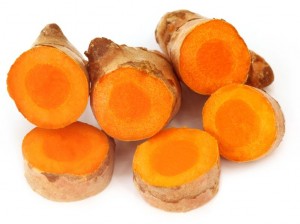By Sayer Ji
Contributing Writer for Wake Up World
You know turmeric has health benefits, most notably reducing inflammation, but did you know it may also protect and heal the damaged and diseased liver?
A new clinical trial published in the journal BMC Complementary and Alternative Medicine is shedding light on turmeric’s remarkable liver protective and regenerative properties.[1]
South Korean researchers at the Clinical Trial Center for Functional Foods, Chonbuk National University Hospital, tested their hypothesis that turmeric may improve liver function by administering a fermented form to subjects, 20 years old and above, who were diagnosed mild to moderate elevated alanine aminotransferase (ALT) levels, a maker for liver damage and/or dysfunction.
Sixty subjects were randomized to receive 3.0 g per fermented turmeric powder (FTP) or placebo 3.0 g per day for 12 weeks. The treatment group received two capsules of FTP three times a day after meals, for 12 weeks.
What were the results?
[pro_ad_display_adzone id=”110028″]
Not only did FTP significantly reduce ALT levels in subjects but also reduced serum aspartate transaminase (AST) and gamma-glutamyltransferase (GGT), two additional enzymes which when elevated are commonly associated with liver damage. The effects were maintained as long as the subjects remained on the treatment. Also, FTP was well tolerated and without significant adverse effects.
This study adds additional weight to a rather vast body of preclinical research that has accumulated over the past two decades confirming turmeric and its primary polyphenol curcumin’s liver protecting properties. The GreenMedInfo.com database now contains 86 studies demonstrating the ability of turmeric (and curcumin) to protect the liver against a wide range of chemical and drug exposures.[2] We recently featured a study published in the Journal of the Medical Association of Thailand which revealed the potential of turmeric to protect and regenerate the diabetic liver.[3]
Turmeric May Also Kill Liver Cancer
What may be even more remarkable is the accumulating research on the anti-liver cancer properties of turmeric (and curcumin). GreenMedInfo.com has 26 preclinical studies showing it kills liver cancer cells and tumors, including one case study involving a 6-month old infant with a life-threatening liver vascular tumor (hemangioendothelioma) who was reported treated successfully with a dietary supplement of curcumin, with 6-year follow-up.[4]
One of the most remarkable facts about turmeric as a potential drug and chemotherapy alternative is its exceptionally high margin of safety. A 2001 study in cancer patients reported that quantities of curcumin up to 8 g, administered per day for three months, were not toxic and resulted in significant anti-cancer properties in a number of those treated.[5] Considering that turmeric is only 3-4% curcumin by weight, this implies that a larger quantity of turmeric can be consumed safely, as well.
Of course, while these results are promising, the real solution to elevated liver enzymes is to identify the underlying causes, e.g. infection, NSAID use, chemical exposures, dietary intolerances, etc., and remove them. Failing that, those within the integrative medical field who are looking for evidence-based ways to address the sometimes inevitable hepatotoxicity of standard drug-based treatments may find a role for turmeric (curcumin) in their practices. Other folks, simply looking for ways to improve their health and to prevent liver problems may wish to consume smaller doses through incorporating the spice (which must be organic to avoid the dangers of irradiation) into traditional recipes at culinary doses. [see our EATomology project for guidance on this]
For more information on Turmeric’s amazing healing properties read my article: 600 Reasons Why Turmeric May Be the World’s Most Important Spice.
Article Sources
[1] Sang-Wook Kim, Ki-Chan Ha, Eun-Kyung Choi, Su-Young Jung, Min-Gul Kim, Dae-Young Kwon, Hye-Jung Yang, Min-Jung Kim, Hee-Joo Kang, Hyang-Im Back, Sun-Young Kim, Soo-Hyun Park, Hum-Young Baek, Yong-Jae Kim, Joon-Yeol Lee, Soo-Wan Chae. The effectiveness of fermented turmeric powder in subjects with elevated alanine transaminase levels: a randomised controlled study. BMC Complement Altern Med. 2013 ;13:58. Epub 2013 Mar 8. PMID: 23497020
[2] GreenMedInfo.com, Professional Feature: Focus Turmeric’s Hepatoprotective Properties Articles (86 abstracts)
[3] GreenMedInfo.com, Turmeric May Repair and Regenerative the Diabetic Liver
[4] Lewis A Hassell, Le Dinh Roanh. Potential response to curcumin in infantile hemangioendothelioma of the liver. Pediatr Blood Cancer. 2010 Aug;55(2):377-9. PMID: 20582974
[5] A L Cheng, C H Hsu, J K Lin, M M Hsu, Y F Ho, T S Shen, J Y Ko, J T Lin, B R Lin, W Ming-Shiang, H S Yu, S H Jee, G S Chen, T M Chen, C A Chen, M K Lai, Y S Pu, M H Pan, Y J Wang, C C Tsai, C Y Hsieh. Phase I clinical trial of curcumin, a chemopreventive agent, in patients with high-risk or pre-malignant lesions. Anticancer Res. 2001 Jul-Aug;21(4B):2895-900. PMID: 11712783
Further articles by Sayer Ji
- Groundbreaking Study Finds Turmeric Extract Superior to Prozac for Depression
- Biophotons: The Human Body Emits, Communicates with, and is Made from Light
- A Pox on the CDC’s Vaccination Agenda: The Rise of Herpes Zoster (Shingles)
- 10 Natural Substances That Could Help Cure Type-1 Diabetes
- Natural Compound Prevents Breast Cancer Gene (BRCA1) Malignancy
- USDA Organic Infant Formula Contains Pesticide Labeled As A “Nutrient”
- Glyphosate (Roundup) Carcinogenic In the PARTS PER TRILLION Range
- How to Clean Your Arteries With One Simple Fruit
- 13 Evidence-Based Medicinal Properties of Coconut Oil
About the author:
 Sayer Ji is the founder and director of www.GreenMedInfo.com and an advisory board member at the National Health Federation, an international nonprofit, consumer-education, health-freedom organization.
Sayer Ji is the founder and director of www.GreenMedInfo.com and an advisory board member at the National Health Federation, an international nonprofit, consumer-education, health-freedom organization.
He co-authored the book Cancer Killers: The Cause Is The Cure, and is currently co-authoring another book with Tania Melkonian entitled EATomology: An Edible Philosophy of Food.
Check out Sayer Ji’s new collaborative project EATomology.
[pro_ad_display_adzone id=”110027″]







